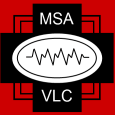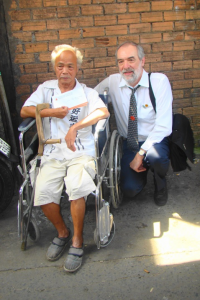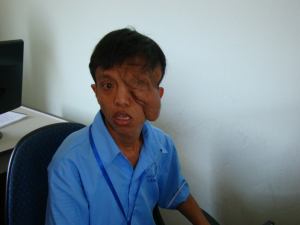VAVA was founded in 2004 and was set up to help the Vietnamese victims of Agent Orange.
Agent Orange is the name given to the deadly chemical which was sprayed by the American forces over Vietnam from 1961 to 1971. More than 80 million litres of poisonous chemicals were used; most of them were Agent Orange and they contained nearly 400 kg of dioxin. Dioxin is one of the worst toxic substances ever produced by mankind, and causes many kinds of severe diseases including cancers, neurological disorders, spinal bifida, a decrease in immunity, disorders in the endocrine system, reproduction disorders and birth defects. Many of these are incredibly severe and disabling. It is thought that the chemical enters the genes, and is passed on from one generation to the next. It is known to have entered the food system via the land and rivers. Nobody knows exactly how many generations will be affected.
At present three million people are affected and 4.8 million people have been exposed. They are the poorest people in the country. 70% of the families are classified as living below the poverty line and 22% of the families have three or more victims. Many are very seriously disabled; 90% are jobless. The burden of care for these victims falls on their parents or relatives, many of whom are now in their old age. The problem is great, and will be made more so when the parents and carers of these victims eventually die.
Where possible VAVA gives help to these people in their homes and in rehabilitation centres and priority is given to the poorest families. MSAVLC has been helping VAVA for many years, with monetary help and provision of equipment. In recent years MSAVLC has provided 90 wheelchairs for distribution in and around Ho Chi Minh City and 50 wheelchairs for the district of Hanoi.
A new residential and rehabilitation centre has been built in Ha Tinh, one of the districts severely affected by Agent Orange. Ha Tinh is one of the poorest provinces in Vietnam. They suffer harsh cold winters and hot dry summers. The land is bad for farming and the infrastructure poor. Most people scrape a living from the land and life is hard, even more so for its Agent Orange Victims of which there are 20,000 in the Province. MSAVLC has provided a great deal of much-needed medical equipment for the centre, and money has also been provided to remove a disfiguring growth on the face of one of its residents.
The problems are endless, with millions of people needing help. With your assistance, MSAVLC hope to continue helping these people as much as they can in the years to come.
In 2011 and 2013 Trustees were invited to visit a number of these victims in their homes, and were shocked to see for themselves the incredible hardship that was faced by the victims and their families.
“Many of the victims that we met were bedbound and others had severe physical and mental disabilities. They were dependent solely on their aged parents for care, who received no respite. We met a young man of 28 who was very severely crippled and mentally disabled. His house was way out in the country at the end of a long muddy lane. Our minibus was too wide for the lane, so we walked in the rain, the kilometre to his house. He was lying on a bed, his back arched and his legs and arms severely contorted. He was moving continually and his face wore an agonised expression. He was totally helpless and entirely dependent on his parents. He was one of four children; the others all had learning difficulties. Both his parents had been soldiers in the war and had been exposed to dioxins. Their house was dark and cold with no heating. His parents grew produce in their garden. They received a small monthly allowance from the Government, and some support from VAVA but they were responsible solely for the day-to-day care of their son. They were loving and dedicated parents but their burden was great. They had no means of moving their son about, so he never left the house and they had no respite care. Although Agent Orange victims very often suffer from internal illnesses and cancers, their son had not been seen or received any medical treatment for many years. Most of the families supporting Agent Orange victims are very poor. Their homes are cold and unheated. It has been known for them to try and heat up their homes with coal braziers used for cooking outside, and they have been poisoned by carbon monoxide fumes! We visited several more families which made us painfully aware of the difficulties experienced by parents in caring for their children, physically, educationally, emotionally and financially. As with our previous visits we were aware that more input and money would have helped these families enormously. However, there are three million people who suffer the effects of Agent Orange in Vietnam. The problem is great and will be made more so when the parents and carers of these victims eventually die.”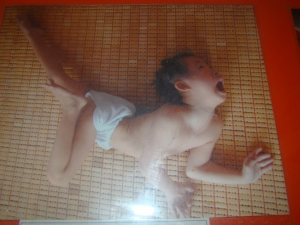 “We drove further on to another small village, Au Khanh, to meet another family. We were warned that this family was very badly affected. There were four children here, ages ranging from 19 to 31. The mother was 56 and the father 57 years old. The three boys, Tran (31), Thiu (24) and Manh (19), were all mentally and physically disabled. When we arrived they were all sitting on the floor eating their meagre lunch. Their sister was not physically disabled, but she had learning difficulties. She had been married and had a child, but her husband was cruel to her, so she had returned home, and she now lived with the family. She worked, washing dishes in a restaurant. Mother also worked a little at weekends, but was needed most of the time to care for the three disabled boys. Father tended the vegetables, but had suffered with mental problems since the war, so the income in the family was only from the little that the mother and daughter could bring in!
“We drove further on to another small village, Au Khanh, to meet another family. We were warned that this family was very badly affected. There were four children here, ages ranging from 19 to 31. The mother was 56 and the father 57 years old. The three boys, Tran (31), Thiu (24) and Manh (19), were all mentally and physically disabled. When we arrived they were all sitting on the floor eating their meagre lunch. Their sister was not physically disabled, but she had learning difficulties. She had been married and had a child, but her husband was cruel to her, so she had returned home, and she now lived with the family. She worked, washing dishes in a restaurant. Mother also worked a little at weekends, but was needed most of the time to care for the three disabled boys. Father tended the vegetables, but had suffered with mental problems since the war, so the income in the family was only from the little that the mother and daughter could bring in!
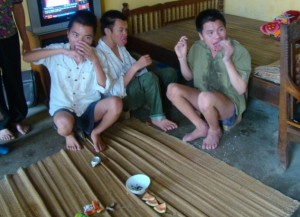 The three boys were in a dreadful state, and needed a lot of care. They were incontinent and the house smelled of urine. The mother coped as best she could, but we could see that life was really dreadful for them all. The boys’ clothes were clean but ragged. They had some health care insurance from the Government, but not any other income. Apparently, father claimed he was a soldier but he did not have his military papers which would entitle him to a pension; this was being looked into by VAVA. We wondered whether he had fought for the South in the war, and didn’t like to admit it!
Mother was very upset as she told her story to the VAVA representative, and father had tears in his eyes. We gave them a bag of groceries, but it seemed inadequate, so we gave them 500,000 dong ($25) in cash, as well. It won’t go far, but at least it will help a bit. The parents said that wheelchairs would help them greatly as they would be able to move the boys around more easily, without having to lift them everywhere. Mother was very tiny; it must be very difficult for her.”
“We visited two more Agent Orange victims in their homes, accompanied by an old soldier who was the local official from VAVA at district level. Our first visit was to meet Nguyen Thi Tinh, a young lady of 34 who was severely mentally and physically disabled. She was laid on a bed in a darkened room, could not move about and was totally dependent on her aged parents. Both her parents had been soldiers in the war and both had been exposed to dioxin. There were two other children who were not affected. The family coped solely with her care and received a grant of 420,000 Dong a month (£12). Life was hard for them all, with no respite, and both parents were old and frail.
Secondly we visited Ha Dac Cu. He was 30 years old and physically disabled but mentally very bright. He had short deformed legs and feet and was unable to walk or move about, and his body, arms and hands were crippled. He had an old computer and watched television, but sadly he had received no schooling and was unable to read or write. He had to be carried everywhere as the wheelchair he had was now broken. His father had been a soldier and with his mother they cared for Cu by themselves. His quality of life was poor due to his lack of education and opportunities, and therefore his potential was not realised. Both visits made us aware of the difficulties experienced by families when caring for their children both physically, educationally and financially. Both families coped solely for the care of them with very little funding or respite. Their homes were basic, dark and cold, life was hard. With more input and money both families’ burdens could have been made more bearable. The visits emphasised the great need for more funding to pay for more practical help, education, equipment and emotional support.”
The three boys were in a dreadful state, and needed a lot of care. They were incontinent and the house smelled of urine. The mother coped as best she could, but we could see that life was really dreadful for them all. The boys’ clothes were clean but ragged. They had some health care insurance from the Government, but not any other income. Apparently, father claimed he was a soldier but he did not have his military papers which would entitle him to a pension; this was being looked into by VAVA. We wondered whether he had fought for the South in the war, and didn’t like to admit it!
Mother was very upset as she told her story to the VAVA representative, and father had tears in his eyes. We gave them a bag of groceries, but it seemed inadequate, so we gave them 500,000 dong ($25) in cash, as well. It won’t go far, but at least it will help a bit. The parents said that wheelchairs would help them greatly as they would be able to move the boys around more easily, without having to lift them everywhere. Mother was very tiny; it must be very difficult for her.”
“We visited two more Agent Orange victims in their homes, accompanied by an old soldier who was the local official from VAVA at district level. Our first visit was to meet Nguyen Thi Tinh, a young lady of 34 who was severely mentally and physically disabled. She was laid on a bed in a darkened room, could not move about and was totally dependent on her aged parents. Both her parents had been soldiers in the war and both had been exposed to dioxin. There were two other children who were not affected. The family coped solely with her care and received a grant of 420,000 Dong a month (£12). Life was hard for them all, with no respite, and both parents were old and frail.
Secondly we visited Ha Dac Cu. He was 30 years old and physically disabled but mentally very bright. He had short deformed legs and feet and was unable to walk or move about, and his body, arms and hands were crippled. He had an old computer and watched television, but sadly he had received no schooling and was unable to read or write. He had to be carried everywhere as the wheelchair he had was now broken. His father had been a soldier and with his mother they cared for Cu by themselves. His quality of life was poor due to his lack of education and opportunities, and therefore his potential was not realised. Both visits made us aware of the difficulties experienced by families when caring for their children both physically, educationally and financially. Both families coped solely for the care of them with very little funding or respite. Their homes were basic, dark and cold, life was hard. With more input and money both families’ burdens could have been made more bearable. The visits emphasised the great need for more funding to pay for more practical help, education, equipment and emotional support.”
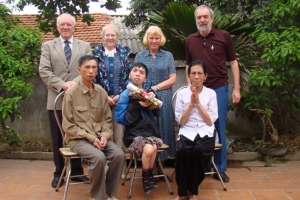
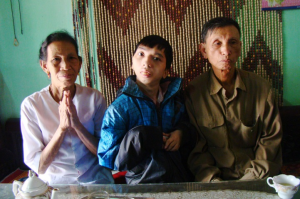
2015
In April 2015 a delegation of Trustees from MSAVLC visited the VAVA Association in Hanoi to talk to officers, and check on the equipment that was purchased in 2013. They went on to visit two poor families who had been recipients of wheelchairs, and learnt how being mobile had made such an amazing difference to their lives.
Later that month the Trustees visited the VAVA Rehabilitation Centre at Can Xuyen in Ha Tinh, and inspected, and witnessed in use, the audiology equipment that had been purchased for them.
On returning to England it was agreed by the Trustees to purchase a further 200 wheelchairs for VAVA victims. MSAVLC hopes to continue supporting VAVA well into the future.
2019
Since 2015 MSAVLC has been in regular contact with the officers of VAVA, and provided much-needed equipment for their centre in Ha Tinh Province. We also provided funding for an essential operation for a young Agent Orange victim.
Over 600 wheelchairs have been purchased and distributed in many provinces in Vietnam. Receipts for the equipment have been received, along with some photographs of the recipients of the wheelchairs.
In 2017 MSAVLC was awarded a Certificate of Golden Hearts, in recognition of our work for the victims of Agent Orange.
2020 UPDATE
Due to the Covid 19 pandemic, Trustees were not able to visit VAVA this year as planned.
During the year 240 more wheelchairs were purchased, 178 traditional and 62 specialised ones. These were distributed to 13 provinces throughout Vietnam, enabling the victims of Agent Orange to become mobile and more self-sufficient. Invoices, receipts and photographs of the wheelchairs and some of their recipients were received, and MSAVLC are delighted to assist in this way.
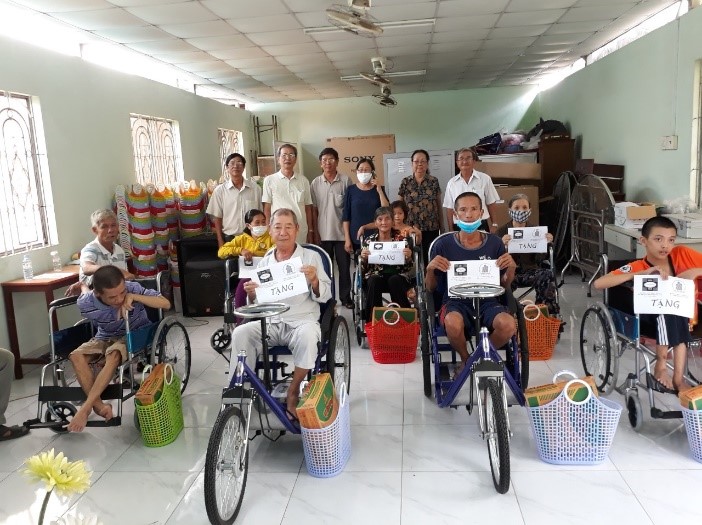
2023 UPDATE
In 2022 MSAVLC provided 545 wheelchairs for Agent Orange victims, and during their visit to VAVA this year, Trustees from MSAVLC were taken to visit some of the recipients of the wheelchairs in their homes.
Two of these victims were war veterans who had suffered from the effects of Agent Orange and were severely disabled. The first was Mr Pham Van Quyet who was a soldier in Quang Tri Province where the fighting was intense during the American War. He was severely disabled and could not walk. We drove into the countryside to visit him, through a large area which was devoted to the carving of locally-quarried stone. The whole area was thick with grey dust which settled everywhere, around the houses and on the trees and plants. It must be a very unhealthy place to live, but we found Mr. Pham Van Quyet and his wife in a two-roomed cottage on the edge of the village. The wheelchair which he had been given meant that at last he could leave his home, and his grandchildren were able to take him out into the village. His son was also affected by Agent Orange.
We drove back into the city to visit Mr. Nguyen Tu Ve, another Agent Orange victim who had received one of the wheelchairs. His wife was his sole carer and was very appreciative, but she became terribly upset and told us that it was very hard work for her, as she had no family nearby. She provided us with cups of green tea and hugged us tightly when we were due to leave. It was quite an emotional day, and we were able to appreciate just how important a wheelchair was to these victims, and how it could change their lives.
We also visited a Social Rehabilitation Centre on the outskirts of Hanoi. The centre caters for both residential and day-care victims of Agent Orange, aged up to 50 years old. They are given an education and taught computer skills, sewing and handicrafts, as well as general life skills. The centre is run entirely by volunteers. We went into the main hall and helped to present the five wheelchairs that had been provided by MSAVLC, and we then went on to view the centre and meet some of the occupants. Among the people we met was a young lad who was unable to read or write when he arrived at the centre four years ago, but he could now do both and had been taught computer skills. He also looked after the centre’s three cows.
Our visits to the victims served to demonstrate how widespread the continuing legacy of Agent Orange is upon Vietnam’s population. And whilst our wheelchairs make a vast difference to the lives of those who receive them, there are many, many others waiting.
VAVA is a nationwide organisation run almost entirely by retired military veterans, all of whom are volunteers. They do a fantastic job in helping thousands of unfortunate people, and they stressed that every dollar donated goes directly to help the people. They told us that thousands more wheelchairs were needed, and the Trustees of MSAVLC agreed to purchase more.





